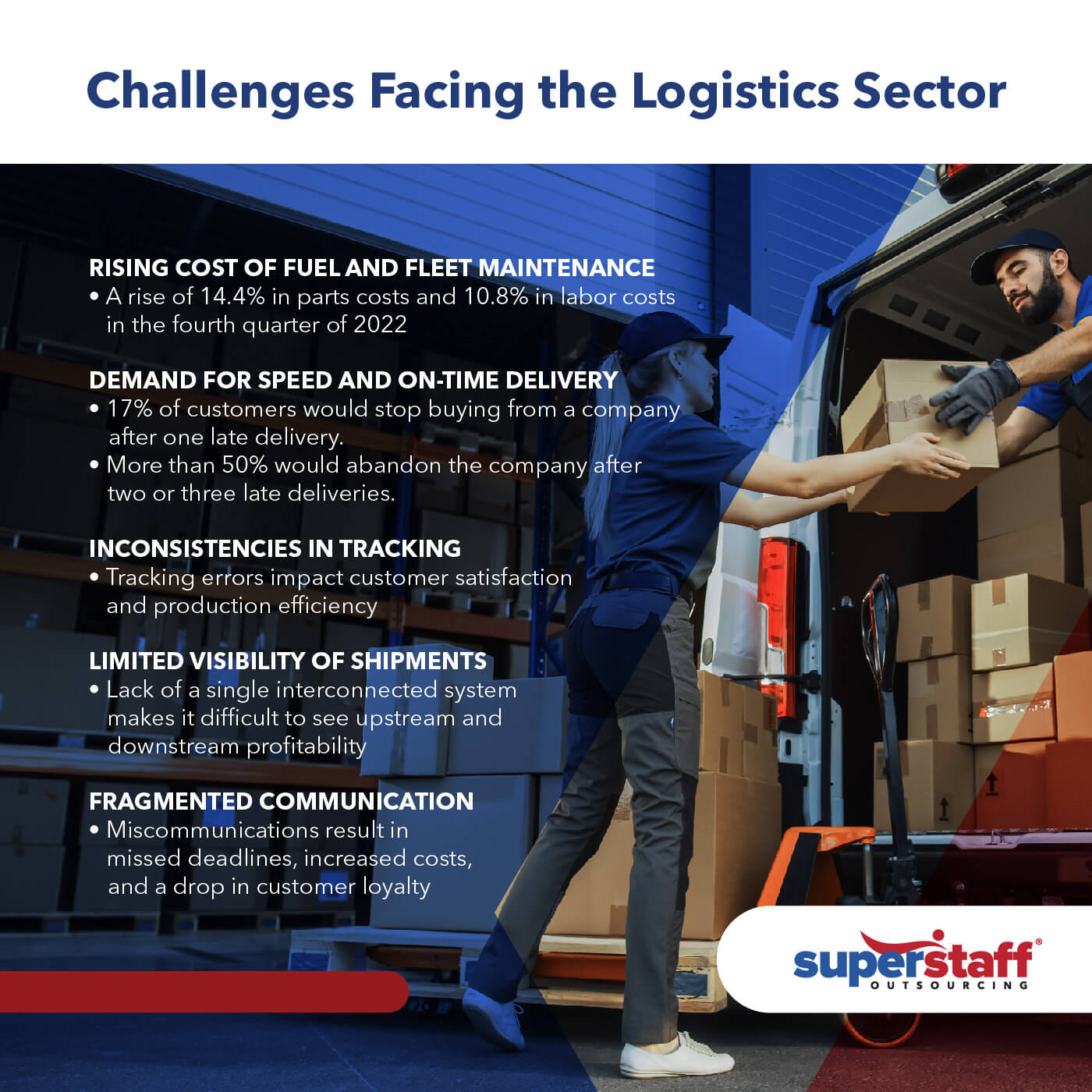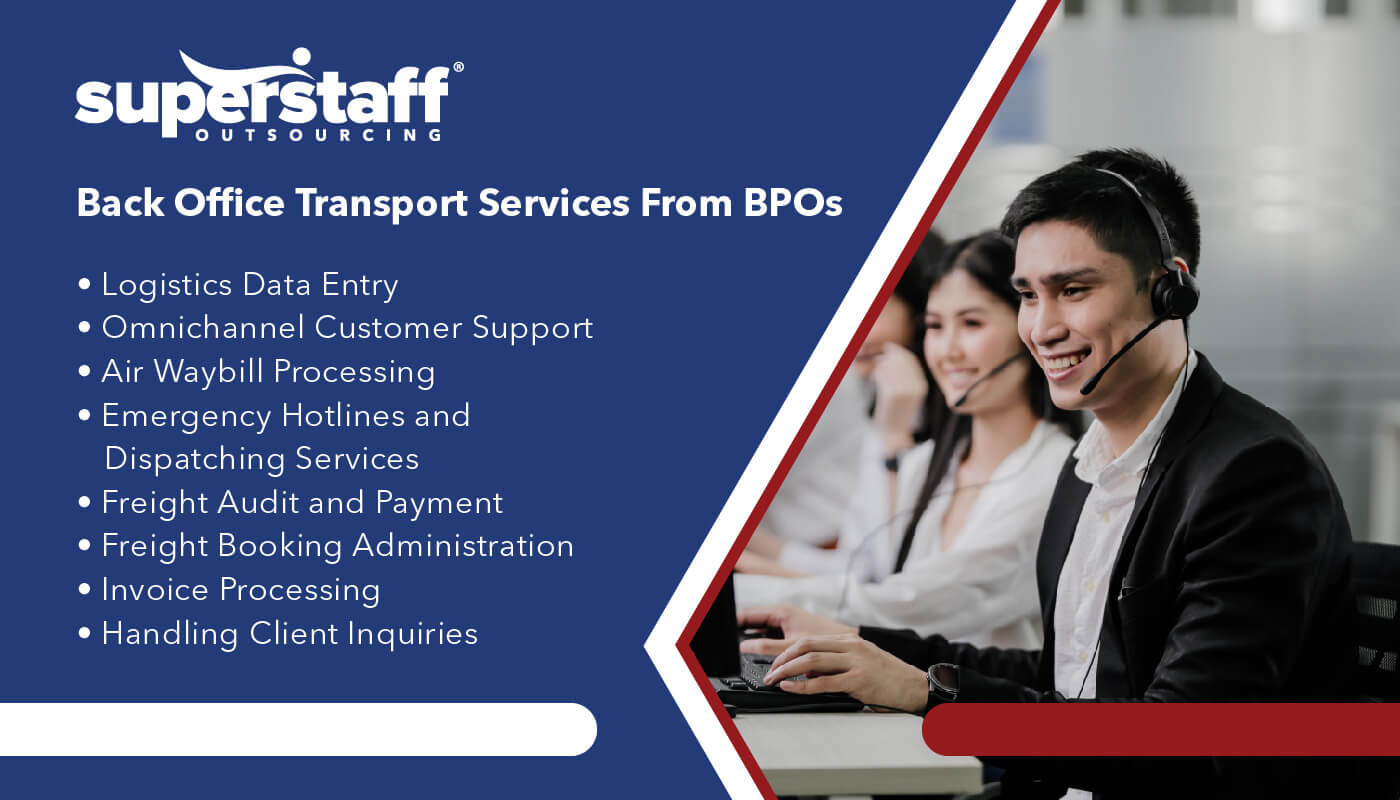
As we go deeper into the post-pandemic era, it’s becoming increasingly clear that disruptions to supply chain operations are here to stay. Many factors, from geopolitical conflicts to inflationary pressures, are poised to impact the flow of goods and access to crucial global resources.
In the face of a rapidly changing supply chain landscape, staying agile and flexible is more crucial than ever. Fortunately, companies can position themselves for long-term success amid international disruptions by outsourcing back-office transport services.
Are you interested to learn more?
In this article, we’re taking a quick look at the significant challenges logistics companies face and tackle the advantages of outsourcing transport services.
Top 5 Challenges Facing the Logistics Sector Today (and How Outsourcing Transportation Services Can Help)

#1: Rising Cost of Fuel and Fleet Maintenance
As inflation cranked up post-pandemic, gas prices skyrocketed, hitting a record high in 2022.
The Nonprofit Federation of Motor Clubs AAA reported that the national average for a gallon of regular gasoline has risen by eight cents to $3.66 due to increased oil prices. A gallon is still 41 cents cheaper than last year, but analysts predict that prices may continue to increase shortly and negatively impact the sector.
However, while fuel is an especially critical commodity in transport, gas prices are not the only volatile expense that logistics companies must watch out for. Parts and labor costs continue to rise, creating significant financial challenges in maintaining fleets.
Compared to the fourth quarter of 2021, there was a rise of 14.4% in parts costs and 10.8% in labor costs in the fourth quarter of 2022.
Fortunately, businesses can cut these costs by outsourcing to countries with more competitive labor costs and a lower standard of living — a proven cost-saving strategy that many industry leaders already use.
Outsourcing would also allow them to scale their operations up or down to keep pace with industry demands, eliminating the need for costly hiring and lay-off cycles.
Additionally, by taking on administrative tasks, service providers free up the resources of logistics companies so they can focus their resources on their core competency.
#2: Demand for Speed and On-Time Delivery
Apart from the rising costs, the demand for better delivery times in the digital era is another problem logistics problems must grapple with.
Geopolitical tensions and the crippling labor shortage make it even more difficult for businesses to keep pace with logistical demand. On top of this, the growth of e-commerce has also put a strain on capacity and fueled more need for speed in services.
Retail and e-commerce giants are already offering same-day deliveries to gain an edge. But they are putting more pressure on suppliers and trucking companies to offer these delivery options. Walmart, for instance, has tightened its “on-time, in-full” program by raising the bar on delivery times.
While a recent study found that customer demand for faster response times remains among a company’s top challenges, meeting client expectations can be challenging when unmet upstream supply chain deadlines and delays trickle down to the consumers.
Sadly, the consequences can be pretty severe. A survey found that 17% of customers would stop buying from a company after one late delivery, while over half would abandon the company after two or three. This issue affects more than just customers; consistently poor delivery performance also leads to problems such as production delays and avoidable expedited shipping costs.
One way to avoid these problems is by outsourcing your transport management to certified logistical experts. Third-party logistics (3PL) providers have the knowledge, experience, and resources needed to boost on-time delivery performance, manage complex supply chains, and anticipate delays.
Outsourcing transport services can also help businesses elevate their customer experiences since BPOs provide real-time updates and proactive communication in case of delays or other issues, with a level of transparency guaranteed to build consumer trust.
#3 Inconsistencies in Tracking
Tracking inconsistencies and errors significantly impacts the supply chain management system.
Consequently, if there are inconsistencies, such as delayed updates and typo errors, managing logistics will be even more challenging. For instance, if a shipment delay is undocumented, it may be too late to take action when the company finds out.
Not only will tracking inconsistencies trigger massive delays, but they will also inevitably impact customer satisfaction and production efficiency.
One strategic solution that would solve all these issues is outsourcing data entry and inventory management tasks to a reputable 3PL partner. BPOs can streamline data collection and entry and ensure accurate tracking and management of inventory throughout the supply chain so businesses are alerted on any issues that may arise during the shipping process.
#4 Limited Visibility of Shipments
Visibility has always been an essential aspect of supply chains.
However, because of the growing complexity of supply chains, many businesses experience blind spots across their transportation management systems. With so many service levels, constraints, requirements, and disruptions in every transaction, keeping track of all the moving parts is challenging.
Before the digital age, a simple analytics dashboard would have secured a centralized data view and fully understood a business’ logistics operations. However, today, more than such a system is needed to meet the demands of companies that require a more comprehensive view of their supply links.
Global businesses are exposed to environmental and political changes that create a lot of uncertainty, making it even harder to manage supply chains. Since not all technologies can support every supply mode, companies struggle with siloed or limited visibility, which becomes incredibly complex for logistics companies operating several different supply chains simultaneously.
Additionally, multi-industry business networks, where organizations partner with manufacturers, distributors, and logistics service providers, add to today’s supply chain complexity. Each set of business processes is part of a more extensive ecosystem. The lack of a single interconnected system makes it difficult to see how upstream and downstream flows affect the operation’s efficiency and profitability.
Businesses can overcome these challenges by outsourcing their transportation services. Relying on the expertise and resources of third-party logistics providers can benefit businesses with improved data collection and analysis and increased transparency throughout the supply chain.
These providers often have specialized Transportation Management System (TMS) tools to help enterprises track shipments and inventory, identify bottlenecks and inefficiencies, and respond quickly to disruptions.
#5 Fragmented Communication
Communication is critical to ensuring all stakeholders work towards the same goals.
However, communication barriers lie across every supply chain link, and when triggered, these can easily lead to delays in the logistics and managed transportation process. For instance, if one department is unaware of specific changes, it won’t be able to adjust its operations to accommodate new schedules or shipment addresses. This, in turn, would result in missed deadlines, increased costs, and a drop in customer loyalty.
Logistics companies can easily avoid these problems through outsourcing with improved connectivity and efficiency. A 3PL company leverages collaboration tools for close coordination and easy access to up-to-date information. They also establish clear communication channels among stakeholders and invest in staff training to ensure seamless collaboration among everyone onboard.
Back Office Transport Services From BPOs
Now that we have a broader understanding of the logistical challenges in the post-pandemic era, let’s delve deeper into the advantages of outsourcing warehousing and transportation services.

Logistics Data Entry
Data has become critical to successful business in today’s digital age. Companies increasingly rely on analytics to make informed decisions, optimize operations, and improve performance.
In logistics, for instance, data is used to track shipments, monitor inventory levels, manage transportation routes, and analyze customer behavior, among other things. It’s essential to manage supply chains efficiently and meet customer expectations.
However, as the touchpoints increase in volume and complexity, many companies turn to data entry solutions to help process information more quickly and efficiently.
Omnichannel Customer Support
As a sector plagued by unpredictable disruptions, customer service (CS) is especially important for logistics companies.
The right CS team can help logistics companies manage global regulations, trade wars, weather patterns, and disruptions by providing exceptional technical support and regular updates on order status.
By providing quality, 24/7, omnichannel support that covers everything from email and chats to phone and social media management, BPOs help logistics companies navigate large volumes of customer inquiries and support requests, especially during peak seasons.
Air Waybill Processing
An air waybill (AWB) is a crucial document ensuring the smooth movement of goods through the logistics supply chain. Think of it as a contract between the air freight shipper and the carrier that details the specific terms of transport and the obligation of each party.
The waybill contains information about the shipper, the consignee, the origin and destination airports, the routing details, the shipment’s weight and dimensions, and any special handling requirements or restrictions.
Air waybill processing is critical for businesses, and any delays or errors can have serious consequences. Outsourcing can be beneficial in preventing such mistakes.
Working with specialized providers ensures that it is filled out in compliance with relevant regulations and requirements to avoid additional costs or penalties.
3PLs also use the latest Transportation Management Software and automation tools to quickly and accurately process airway bills, reducing processing times and improving overall logistics efficiency.
Emergency Hotlines and Dispatching Services
From accidents to natural disasters, a lot can go wrong in logistics, so businesses need a specialized system that can quickly address unexpected events affecting their delivery of goods.
These hotlines and dispatching services are typically operated by trained professionals equipped to handle emergencies. Their goal is to minimize disruptions to the logistics network and ensure timely delivery of goods in challenging circumstances.
Dispatchers communicate with drivers and guide them on the ideal delivery routes and schedules. Essentially, they act as the core provider of transport information.
One of the main benefits of outsourcing dispatch services is that BPOs offer 24/7, omnichannel support, meaning your team can reach them from anywhere in the world at all times of the day, across all channels. BPOs also have deep expertise and the latest technology to optimize routes, reduce delivery times, and improve overall logistics operations.
Freight Audit and Payment
Freight audit and payment is a process that involves the verification and payment of carrier invoices for freight services. The ultimate objective is to ensure that the rates charged are accurate, that the services were delivered as agreed upon, and that any additional fees or surcharges are valid.
Can outsourcing also help businesses ensure they’re paying a fair amount for the right services?
The short answer is yes. Outsourcing companies can streamline the process and improve accuracy by providing specialized accounting and bookkeeping services. BPOs can bring in experts who are well-versed in the complex rules and regulations of transportation accounting, allowing for better auditing and payment processing.
Freight Booking Administration
Freight booking administration in logistics refers to arranging transportation for goods from one location to another. This typically involves booking carriers, negotiating rates, coordinating pick-up and delivery times, and completing all necessary paperwork and documentation.
One proven strategy to simplify this overly complex process is working with outsourced virtual assistants (VAs). As efficiency experts, VAs can efficiently juggle repetitive and time-consuming tasks such as data entry, order processing, and shipment tracking. They are also equipped with the necessary resources to provide timely updates on shipment status and inventory levels to help companies make informed logistical decisions.
Invoice Processing
Invoice processing in logistics refers to the steps involved in handling and paying invoices received from vendors or service providers for goods or services provided.
It typically involves receiving invoices, verifying the accuracy of the information on the invoices, resolving any discrepancies, and approving them for payment.
Since the processes are time-consuming and complex, especially for larger logistics companies with high invoices, outsourcing can be a great strategy to optimize the workflow.
BPOs will tap their pool of experienced providers to handle the invoicing process, from capturing invoice data to robust reporting systems. As skilled processors, they have systems in place to catch discrepancies and ensure the accuracy of the invoice.
Handling Client Inquiries
One of the many benefits of outsourcing transportation is quicker response times for inquiries.
Having a dedicated CS team to address inquiries and concerns in a proactive and timely manner has been proven to help businesses expand their client base and tap new markets.
By providing top-notch, multilingual support, BPOs can build trust with clients, leading to repeat business and positive word-of-mouth referrals in a business climate that values the customer experience.
Navigate Supply Chain Disruptions by Outsourcing Back Office Transport Services
As businesses brace for more supply chain disruptions, outsourcing can help logistics companies thrive in a dynamic e-commerce landscape. Partnering with an experienced global logistics provider like SuperStaff in the US, the Philippines, and Colombia can help improve your supply chain visibility, increase efficiency, and reduce costs.
If you belong to the prestigious league of Fortune 500 Companies or are a thriving start-up seeking to expand globally, please take action to secure your supply chain before the next disruption hits.
Please contact us today to learn more about how our solutions can help your business navigate supply chain disruptions.






